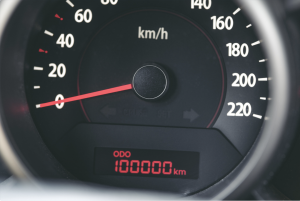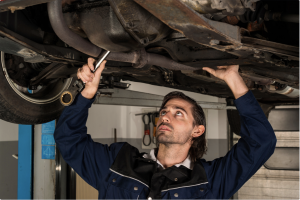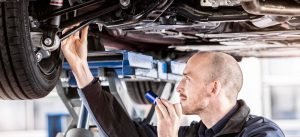Have you ever been naively caught up in a car scam?
Are you buying your first used car and don’t want to fall into the trap of the many scams out there? You’ve come to the right place!
I’m sharing the 5 most frequent used car scams to avoid. These come from the personal experiences of our network of inspectors or our clients who have been duped before their inspection with Kiwiz.
Here’s a breakdown of the most common used car scams to avoid in Canada:
1.The “fake private sellers” or “curbsiders”
Curbsiding, also known as “sidewalk sale,” is the sale of vehicles by unlicensed dealers, that we call “fake private sellers” in Quebec. People pretend to be private sellers, as if you were selling a car yourself for example, but they don’t reveal that it’s a business where they sell multiple vehicles.
While curbsiding is illegal in Canada, this doesn’t stop some malicious and unscrupulous sellers from making big profits with this practice.
According to Georges Iny, President of the automobile protection association (APA), “to be competitive and make a profit, the fake private seller has no choice but to misrepresent”. Therefore, they can tamper with the mileage, lie about the condition of their cars, etc.
In Ontario for example, registered dealers are required by law to disclose material facts that could influence the decision to buy a vehicle. The curbsider (the fake private seller in Quebec), is not bound by law. So for example, if the vehicle has been in an accident, the dealer is legally required to tell you, but the curbsider or fake private seller will not tell you, because you won’t be able to take action against them.
Indeed, be careful, lawsuits are almost impossible, precisely because the “fake private seller” does not have a license and does not have a physical location (no address). Often involved in accidents, rebuilt with stolen parts, people like that will do anything to sell you a vehicle.
Tips to avoid the “curbsiders”scam:
- Make sure the person gives you an appointment at their home, and not in a shopping center parking lot.
- Make sure the car is registered in their name. Sometimes a frien will help the uninformed seller to market the vehicle, but in this case, you must ensure you meet the real owner at the time of sale.
- Others will also pretend to sell the vehicle of their recently deceased grandmother, or their mother who has returned to her home country, to diguise the scam. It’s up to you to be cautious.
- Search for the name of the so-called private individual on Google, or on used car “marketplaces.” If several cars appear in the results, it’s a bad sign!
2. Mileage tampering or odometer rollback used car scam to avoid
According to automotive journalist Antoine Joubert from The Car Guide, “it’s easy to believe that 20% of vehicles over five years old in Quebec do not display the correct mileage.” This represents 1 car out of 5 that would be tampered with, it’s not insignificant!
A little-known practice, but more widespread than you think. Mileage tampering consists of lowering the actual mileage of the car. So, someone who wants to sell their car that actually has 200,000 km could lower the mileage to 100,000 km. These devices (electronic devices) are now sold on classifieds websites for a few hundred dollars each. You’ll understand that it’s very easy to perform the operation: a short YouTube video, and it’s done.
Buying your used car from another province is riskier. Why? Because some resellers and dealers source their vehicles there bascause the evidence is harder to track down with a vehicle from another province, since the provincial computer systems do not communicate with each other. Therefore, there is no proof of the actual mileage of your next used car, even by analyzing CARFAX or other history reports.
To avoid all this trouble: consult the Carfax report, ask for any maintenance history the previous owner may have provided, and have the vehicle mechanically inspected by a Kiwiz mobile inspector who is an experienced mechanic who will check certain elements (paint, cosmetic defects, wear, etc.) to detect potential odometer rollback.
What is the CARFAX report? It’s a report that indicates each time the mileage has been recorded by certified technicians or partner repair centers. These reports should always show that the mileage is increasing. Just like in the movie Ferris Bueller’s Day Off, driving the car in reverse will not roll back the odometer! Carfax is not perfect and some cars may have few entries or incorrect information and typos, but these reports are generally reliable. I sometimes see odometers recorded in miles instead of kilometers for a particular entry, which makes me extra cautious.
Learn more about odometer rollback here.
3. Third used car scam to avoid: the payment method
When it comes to paying, you are surely not the only one who has hesitated about the payment method to finalize the purchase of your shiny car. Some scams by check or even bank transfer have already been seen in the past. Fraudsters sometimes ask for deposits (a partial payment made on a sum to be paid) without ever following up with the buyer. Other times, scammers will tell you to transfer money via Moneygram or Western Union, both of which specialize in international transfers.
Another sign the situation is fishy is when the seller tries to avoid using the messaging system of the resale platform where the ad is located and asks for your email, which is personal information, to communicate with you and send you a payment link.
We strongly advise you to meet the seller in person and have seen the car (or even driven it) before any money transfer, no matter the amount, and even if it is a simple deposit.
According to the Montreal Police Service (SPVM), the certified check is the safest payment when buying your next used vehicle. This is indeed the case everywhere in Canada.
A safe technique: ask to have a Kiwiz mobile inspector come and inspect the vehicle
If he agrees to have an inspector come for a pre-purchase inspection, it proves that he really owns a vehicle and that he has nothing to hide from you.
If he refuses (no matter the reason!): it’s a bad sign! In fact, a dishonest seller might tell you that the vehicle is in storage outside the province, and that to move it to your province, you will have to put down a deposit, blah blah… you can see where this dishonest seller is coming from…
4. Hidden defects
One of the most common scams when buying a vehicle: hidden defects.
Before diving into examples, two types of defects exist:
a defect that the seller is not aware of. It can happen. An individual who sells you his car knows the past maintenance he has done on his car, but he does not know the condition he sells it to you (unless he has had a pre-sale inspection done in the past month, which is unlikely!). As you can understand, it’s the pre-purchase inspection‘s role to inform you of the vehicle’s defects.
- a hidden defect (the one we will talk about here): it is a problem that the owner is aware of, but that he voluntarily hides from you. A hidden defect is not perceptible to the naked eye, otherwise it would not be called a… hidden defect. A mechanic expert can most likely unmask it, but probably not you.
And what about the law in all this? In Canada, dealers are required by law to disclose any material fact that could influence a person’s decision to purchase. However, this does not prevent some unscrupulous sellers from ignoring it. After all, their goal is to sell you their vehicle, right? (joke)
Among the most common hidden defects:
The lack of repair or insufficient repairs following an accident, aesthetic modifications by the owner that are defective, annoying noises from a component, etc. To avoid all these troubles and sending a formal notice to the former owner: really work with all the car’s functions/buttons and take a good 30 minutes to do a test drive where you should “push” the car to its limit to see if the feel, the driving and the functionalities are okay. An expert car inspector can obviously do it for you.
Also, take the time to listen attentively to hear any suspicious noises. So don’t put on loud music, save that for later, when you’ve bought it! Another trick: try to drive a route that you take often to see if the car behaves as expected in these conditions (holes, speed bumps, tight turns, stop-and-go traffic, etc.).
Pay attention: Does he make sure that the car is well warmed up before your arrival to hide an irregular idle in cold weather? Has the seller reset the engine light just in time to sell it? Have there been poor body repairs that have only passed a superficial inspection? Has silicone been applied to old tires to make them look new?
5. Bait and switch advertising scam when buying a car
Finally, on our list of the most common used car scams, we have bait advertising.
Bait and switch advertising is the practice of advertising a car, or an offer in general, that may seem too good to be true, to attract the buyer to the dealership. These scams can be difficult to prove because errors and omissions can occur in advertising, but it is good to be on your guard. These scams are not only unethical, but they are also illegal in many jurisdictions.
First case (rather rare): This can also happen inadvertently, when a newly arrived vehicle, but which is already sold, still appears on the dealer’s website.
Second case (more frequent): A person can be baited by an interesting used car. For example, a used car is advertised at an incredible price to attract your attention on the lot. When you arrive, you are told that the car has already been sold, and you are directed to other cars in the dealer’s inventory, at a… higher price!
Third situation (case of a car trade-in):
Dealers may tempt you with a high estimate of your used car if you are considering a purchase with trade-in. They might say “your car can be worth up to $10,000” when the real value they estimate is $6,000.
This overestimation can be vague, giving the impression that your car is worth more thanks to specific promotions or by playing with words, which gives the dealer an advantage in attracting you with the hope of a good deal. When you are excited about the new car, they reveal the real offer, counting on the fact that you won’t realize their initial deception.
We hope we have helped you and you won’t fall into the trap of used car scammers!
Feel free to check out other articles that will help you in your used car purchase.
See you soon!
















